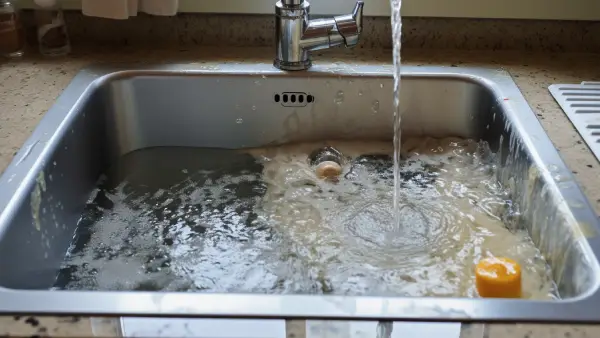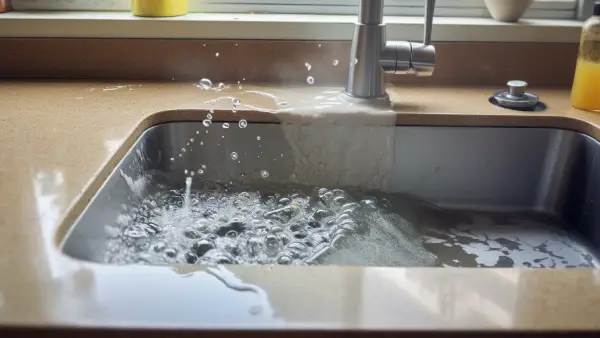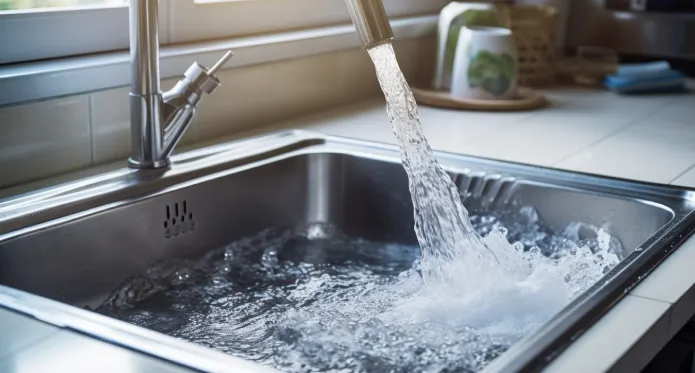Last Updated on November 14, 2023
When you run your dishwasher, the kitchen sink may fill up with water unexpectedly and inconveniently. Having to deal with this perplexing phenomenon can disrupt your daily routine and make you wonder, “Why does my sink fill up when the dishwasher runs?”.
Some common culprits stand out when your sink fills up during the dishwasher cycle. Dishwasher blockage can be a primary reason for this inconvenience. It occurs when your dishwasher’s drainage system encounters an obstruction, preventing it from efficiently expelling wastewater.
On the other hand, clogged sinks can exacerbate the problem. Various kitchen residues, from pasta remnants to grease, can accumulate over time, creating a bottleneck in your sink’s drainage.
We will discuss the reasons why the kitchen sink fills up when the dishwasher runs and how to resolve this issue.
Why Does My Kitchen Sink Fill up When the Dishwasher Runs: Reasons with Solutions

When your kitchen sink fills up while your dishwasher runs, there are several possible reasons why this is happening.
- Dishwasher blockage
- Clogged sink
- Air Gap blockage
- Presence of the drain plug cover
1. Dishwasher Blockage
A blockage within the dishwasher itself is a common and likely culprit of a sink filling up during a dishwasher cycle. When the drain in your dishwasher is blocked, water cannot flow out properly, leading to overflow and water backing up into your sink.
There are several reasons why your dishwasher drain can become blocked. One of the most common reasons is food particles and debris, such as bones or seeds getting caught in the drain or drain hose.
To address a dishwasher blockage, start by inspecting the drain at the back of the dishwasher compartment. Look for any visible blockages such as food particles or debris and remove them.
Then, check the drain hose to ensure that it is free-flowing and that there are no kinks or blockages.
It’s equally important to use the right brand and amount of dishwasher detergent to prevent any residue buildup within the dishwasher that can lead to blockages.
2. Clogged Sink
A clogged sink is another common reason the sink fills up during dishwasher cycles. Certain items like grease, bones, citrus peels, and pasta can cause gradual buildup in your drain pipes, leading to blockages.
To prevent this issue, run your garbage disposal briefly before starting the dishwasher. This process breaks down any food particles and prevents them from clogging your drain.
Another solution is to use sink cleaners specifically designed to dissolve buildup and bacteria in your pipes.
However, if these solutions do not alleviate the clog, consider using a drain snake or contacting a professional plumber.
3. Air Gap Blockage
Another potential cause of a sink filling up when a dishwasher runs could be an air gap blockage.
As a small device, an air gap prevents wastewater from backing up into a dishwasher and contaminating clean dishes. However, if the air gap becomes clogged, water can back up into the sink instead.
To clean the air gap, you’ll need to remove the top cover and unscrew or unsnap the inner protective cap.
A bottle brush can then be used to clear any debris or blockages within the air gap. This should allow proper drainage from the dishwasher and prevent water from spilling into the sink.
4. Presence of the Drain Plug Cover
If you’ve recently installed a new garbage disposal unit and are experiencing sink filling-up issues, the culprit may be the presence of the drain plug cover.
When installing a new disposal unit, it’s common for people to forget to remove this plug cover, resulting in a backup of water from both the sink and dishwasher.
To fix this, simply check your garbage disposal to ensure the drain plug cover has been removed. This should resolve any issues associated with the garbage disposal, including sink backup while your dishwasher runs.
How often should you maintain your kitchen plumbing to prevent sink backups?
You should maintain the plumbing in your kitchen at least twice a year to prevent sink backups. By conducting maintenance every six months, you can proactively address potential issues and prevent them from escalating into major problems.
Start by running your garbage disposal with cold water to prevent buildup and checking for clogs in the sink. Inspecting your dishwasher’s drain and hose for any obstructions is also essential.
Remember to be mindful of what you dispose of in your sink, as certain items like bones, pasta, and grease can lead to clogs over time.
How do you test your dishwasher air gap to ensure it’s preventing sink backup?

To properly test your dishwasher air gap and ensure it prevents sink backup, remove the cover and examine the interior for any blockages or debris, then clear them out if necessary.
The air gap is located near your sink faucet, and you can access it by removing the cover on top. Inside, you’ll find a diverter with a locking clip. Carefully remove this clip to gain access to the inner workings.
Take a close look at the interior and ensure no obstructions could impede proper water flow. If you find any blockages or debris, clear them out to ensure your dishwasher air gap functions effectively.
Can apple cider vinegar unclog a kitchen sink and prevent sink backups?
You can use apple cider vinegar to help unclog a kitchen sink and potentially prevent sink backups. To do this, pour approximately 1/2 cup of baking soda into the drain, followed by 1 cup of apple cider vinegar.
When these two substances combine, they create a fizzing and foaming reaction, which can help break down clogs in your sink pipes. In addition to unclogging the drain, this method may also deodorize it.
Identify and Resolve Sink Backup Issues for a Smooth Running Kitchen Plumbing System
When you face the frustrating situation of your kitchen sink filling up while your dishwasher runs, just check out the reasons discussed above.
Whether it’s a dishwasher blockage, a clogged sink, an air gap blockage, or a garbage disposal plug causing the issue, you now know how to diagnose and resolve it.
Maintaining your dishwasher and being proactive, like using the right detergent and being mindful of what you put down the sink, can prevent future sink backups.
Addressing these issues on time allows you to enjoy a smoothly running kitchen plumbing system without unexpected disruptions.

